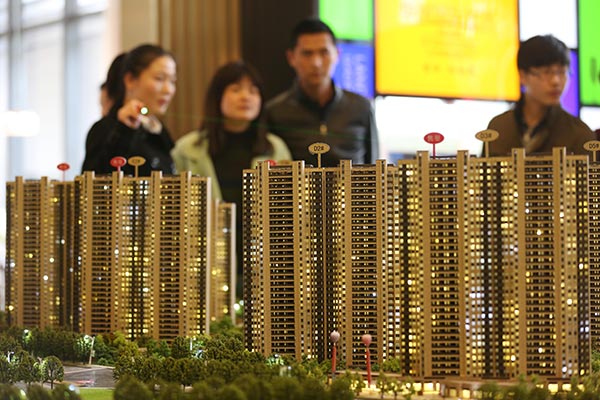Opening the door for non-governmental investment
Updated: 2016-05-14 09:39
(China Daily)
|
||||||||
 |
|
Potential homebuyers examine a property project model in Nanjing, East China's Jiangsu province, Feb 28, 2016.[Photo/VCG] |
Editor's note: The State Council, China's Cabinet, convened a meeting in early May, at which it was decided to launch special supervision over the implementation of State policies aimed at promoting non-governmental investment in order to help stabilize growth, adjust the economic structure and boost employment. The following are comments from some media outlets:
Gov.cn:
What some private enterprises now encounter in their domestic investment bids are not a "glass door" or a "swing door", but rather "no door", as Premier Li Keqiang said at the meeting.
"We should further expand their investment access and extend to them unblocked investment entry," he said.
Statistics indicate that non-governmental investment has accounted for over 60 percent of China's total fixed-asset investment in recent years, and contributed more than 60 percent to the country's gross domestic product growth. At the same time, the private sector has created more than 80 percent of jobs.
Despite growing faster than the country's total investment over the past years, China's non-governmental investment has been decelerating since the fourth quarter of last year and its proportion to the total has also witnessed a decline.
Forcible measures must thus be taken to push for the implementation of policies to create a fair investment environment and promote the recovery of such kind of investment, Li stressed.
"Only after these enterprises become vibrant, can the country maintain its economic vitality and ensure that economic growth stays within a reasonable range," he said.
The meeting also urged governments at various levels to optimize and adjust their non-governmental investment policies, treat State-owned and non-governmental enterprises as equals and improve the services for private investors.
Youth.cn:
Booming non-governmental investment has played an important supporting role behind the country's fruitful campaign to stabilize growth, adjust its economic structure and expand the job market over recent years, but such kind of investment has declined in the first quarter of this year.
Compared with State-led investment, non-governmental investment is more of a gauge of social capital's activeness and widely viewed as a weathervane of China's economic vitality and an important measure of the extent of its economic prosperity. The decline in the first quarter marks the first time in years China's private investment has grown slower than the country's total investment. In the context that the country's economic growth is showing clear signs of a rebound, the first-quarter deceleration of non-governmental investment should prompt high vigilance from decision-makers.
In view of this, the State Council vowed a series of forcible measures to boost the sagging confidence of private enterprises to stimulate their investment enthusiasm.
China's top leaders have made clear that the country will unshakably encourage, support and guide the development of the non-public sector while adhering to a basic economic system led by public ownership. That means the country has not changed its previous policies and efforts aimed at creating a good environment for the non-public sector.
Confidence outvalues gold. China should ensure the legitimate status and fundamental interests of private investors from a legal perspective.
GMW.cn:
Given that the 5.7 percent growth in China's non-governmental investment in the first quarter of this year is 3 percentage points lower than that in the same period last year, the targeted policies and measures rolled out by the State Council to promote the recovery of such investment will be of practical significance.
As early as 2014, the State Council promulgated a guideline document to give non-governmental capital, especially private capital, an active role in some key investment areas. However, the recent declining momentum of such investment shows to a certain degree that the relevant policies and measures have failed to be fully implemented. It also highlights the country still has some policy space for this purpose.
The special supervision and the third-party evaluation vowed by the State Council meeting over the implementation of relevant State policies will undoubtedly exert pressure on local governments to improve their policies. Any barriers artificially set for such kind of investment should be removed and relevant persons should even be held accountable.

 Karst wonderland in Southwest China
Karst wonderland in Southwest China
 Love on the rubble: wedding stories after deadly quake eight years ago
Love on the rubble: wedding stories after deadly quake eight years ago
 Italy's violin-makers struggle to hit profitable note
Italy's violin-makers struggle to hit profitable note
 High-tech gadgets shine at CES Asia in Shanghai
High-tech gadgets shine at CES Asia in Shanghai
 Cannes Film Festival opens amid terror threat
Cannes Film Festival opens amid terror threat
 Supporters of Rousseff clash with police as her removal looms
Supporters of Rousseff clash with police as her removal looms
 Lego opens world's largest store at Shanghai Disney
Lego opens world's largest store at Shanghai Disney
 Exhibition of table setting art held in Beijing
Exhibition of table setting art held in Beijing
Most Viewed
Editor's Picks

|

|

|

|

|

|
Today's Top News
Liang avoids jail in shooting death
China's finance minister addresses ratings downgrade
Duke alumni visit Chinese Embassy
Marriott unlikely to top Anbang offer for Starwood: Observers
Chinese biopharma debuts on Nasdaq
What ends Jeb Bush's White House hopes
Investigation for Nicolas's campaign
Will US-ASEAN meeting be good for region?
US Weekly

|

|









